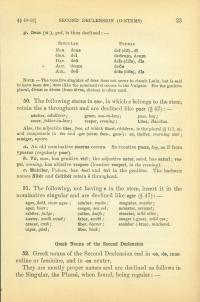50. The following stems in -ero-, in which e belongs to the stem, retain the e throughout and are declined like puer (§ 47).
| adulter adulterer | gener son-in-law | puer boy |
| socer father-in-law | vesper evening | Līber Bacchus |
Also, the adjective līber (free) of which līberī (children) is the plural (§ 111.a), and compounds in -fer and -ger (stem fero-, gero-).
lūcifer morning star
armiger squire
a. An old nominative socerus occurs. So vocative puere (boy) as if from †puerus (regularly puer).
b.Vir (man) has genitive virī; the adjective satur (sated) has saturī; vesper (evening) has ablative vespere (locative vesperī in the evening).
c. Mulciber (Vulcan) has -berī and -brī in the genitive. The names Hibēr and Celtibēr retain ē throughout.
51. The following, not having e in the stem, insert it in the nominative singular and are declined like ager (§ 47).
| ager field (stem agro-) | culter knife |
| aper boar | faber smith |
| arbiter judge | fiber beaver |
| auster south wind | liber book |
| cancer crab | magister master |
| caper goat | minister servant |
| coluber snake | oleaster wild olive |
| conger sea eel | onager (-grus) wild ass |
| scomber (-brus) mackerel | |

